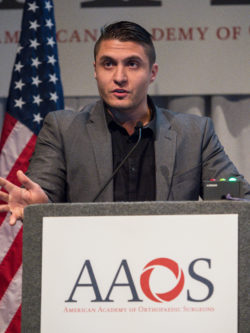You hear it all the time, “You should do a fellowship. Everyone does a fellowship.” Most reports estimate more than 90% of orthopedic residents end up doing a fellowship. The purpose of this segment is to highlight three major reasons one should strongly consider pursuing a fellowship after residency training. Stay tuned for a future blog post in which I intend to provide the “devil’s advocate” position and potential benefits of not pursuing a fellowship.

Your goal of being as marketable as possible comes down to several factors/variables.
Target Specialty Reputation
The first variable to consider is the reputation of your target specialty group. The more well-known, well-established, and prestigious the reputation of the group, the more you should consider fellowship training as a mandatory screening requirement for baseline consideration for employment in the group/university.
Size
The second variable to consider is the size and existing specialization of the group. Chances are, the larger groups will have a subspecialist for all or most major areas of care to be provided. Note that most groups will have this element in the job search when advertising the position available.
Target Location
The third variable one should consider is the target location for practice. If your ultimate goal is to end up in, for example, Los Angeles, you should do your research ahead of time in order to maximize your understanding of the current market saturation status in your field of expertise. Location is considered by many to be the most important factor when deciding whether or not to pursue a fellowship.
Advancing your career in every facet of the game will be facilitated with additional fellowship training. Important considerations can be tailored to your ultimate career goals, but here are some additional variables for your consideration.
Master Your Skillset
The classic pitfall of residency is to think that learning ends when residency ends. Some of my most experienced mentors and attendings that I have worked with have always said that almost all of their current skills and decision-making algorithms began after residency. We all finish residency training boasting slightly different levels of confidence in our given clinically autonomous states.
The truly disadvantaged trainees are not the ones graduating from residency programs that “never let you have the knife”, but rather, the ones that fail to recognize the true potential for post-residency skill acquisition and clinical decision-making growth. Fellowship adds to this facet of your comprehensive clinical mastery.
Networking
Whether we like to admit it or not, our field is still largely rooted in the old mantra – it’s all about who you know. Fellowship opens up an entirely different avenue of resources and individuals that can serve as personal mentors and career advancement advocates. This is particularly true in the academic and large university settings if you are seeking a chair and/or program director position in your ultimate career aspirations.
Transition to Attending
The third critical variable is utilizing the fellowship period as further preparation time in order to launch into the transition to new attending status. Having additional years of training under your belt should only better set you up for that first day when you actually no longer have someone “looking over your shoulders”.
There are also many elements of medicine that can be focused on during fellowship that still, by in large, get neglected during residency. Some examples from my predecessors that I have noticed include becoming more efficient and knowledgeable with coding for office visits and surgical procedures. Your fellowship training should be an opportunity to focus on any elements of clinical/surgical training that you may feel less confident about prior to entering into independent practice.
My final pearl of emphasis builds off of the aforementioned point emphasizing skillset mastery. The more repetitions you get as a physician-in-training, the more efficient you become at an operation, and adding more and more repetitions helps us get closer and closer to mastering a given skillset. This should be your ultimate goal in your career. I could quote Malcolm Gladwell in this section, but I’ll save the obvious.
There are many other reasons I could get into, but these are the major ones that have impacted my decision to pursue a fellowship. I hope this has provided some critical food for thought.







